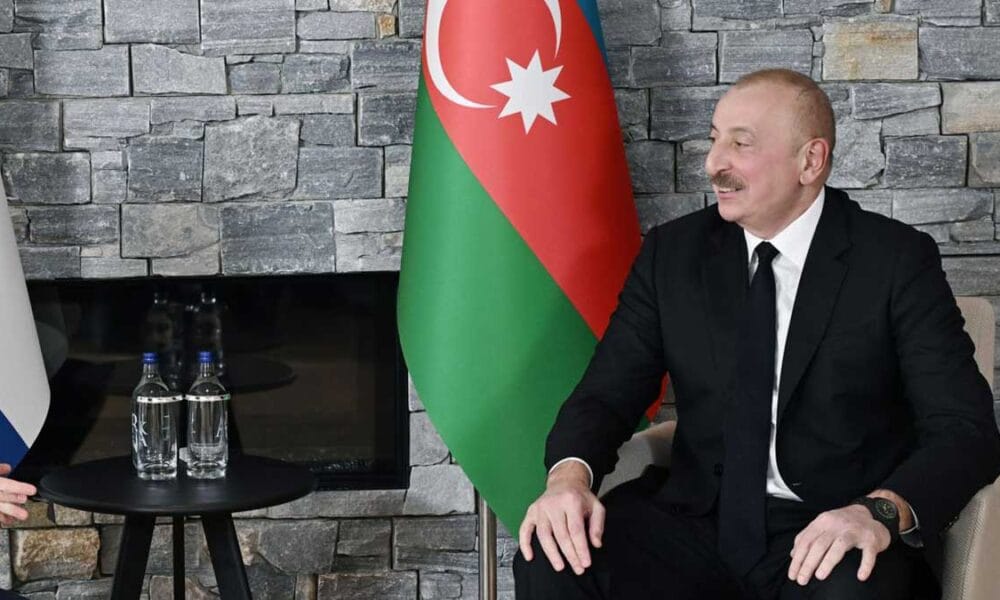KEY POINTS
- •
Azerbaijani President Ilham Aliyev criticized the US former administration’s policies toward Azerbaijan. - •
Aliyev labeled the reinstatement of Section 907 of the Freedom Support Act as “biased”. - •
By contrasting the Biden and Trump administrations, Aliyev seeks to exploit internal US political divisions. - •
Aliyev’s broader aim is to weaken Armenia’s ties with the United States. - •
This strategy distracts from Azerbaijan’s actions, including its aggression against Armenia. - •
For Armenia and its allies, maintaining a unified approach to support Armenia’s sovereignty and democracy is essential to counter Aliyev’s narrative.
Azerbaijani President Ilham Aliyev’s recent remarks at the World Economic Forum in Davos offer a telling glimpse into his calculated approach to international diplomacy. During his meeting with Johnny Moore, head of the US Christian Leaders Congress, Aliyev openly criticized the Biden administration’s policies toward Azerbaijan, portraying them as biased and unjust. These statements, juxtaposed with his praise for the Trump administration’s “positive prospects” in Azerbaijan-US relations, reveal a deliberate strategy to exploit internal divisions within the US political landscape.
Aliyev’s dissatisfaction with the Biden administration is centered around the reinstatement of Section 907 of the Freedom Support Act, which restricts US aid to Azerbaijan due to its actions in the Nagorno-Karabakh conflict. By labeling this move as “evidence of partiality,” Aliyev seeks to undermine the Biden administration’s credibility while portraying Azerbaijan as a victim of unjust treatment. This narrative is not only aimed at appealing to domestic and international audiences but also at creating discord between Armenia and the United States.
The focus on contrasting the Biden and Trump administrations’ policies highlights Aliyev’s attempt to leverage perceived inconsistencies in US foreign policy to Azerbaijan’s advantage. By praising Trump-era relations, Aliyev positions himself as a leader willing to collaborate with the United States under a more favorable administration, subtly signaling his preference for a Republican government. This tactic serves to both undermine the Biden administration’s current policies and lay the groundwork for potential concessions from a future US administration.
Aliyev’s broader goal appears to be to weaken Armenia’s growing ties with the United States, particularly as these relationships have become a cornerstone of Armenia’s post-war recovery and democratic development. By playing on perceived divisions within the US political system, Aliyev attempts to cast doubt on the consistency and reliability of American support for Armenia. This could discourage Armenia from deepening its alignment with Western powers, thereby limiting its capacity to counterbalance Azerbaijan’s alliances with Turkey and Russia.
This strategy of leveraging internal US political divisions to advance Azerbaijan’s regional interests is not new but remains deeply concerning. It undermines the shared principles of democracy, rule of law, and regional stability that Armenia’s partnerships with Western nations are built upon. Moreover, it highlights the dangers of allowing authoritarian leaders like Aliyev to exploit geopolitical tensions and domestic political divides in democratic countries to further their own agendas.
Aliyev’s remarks also serve to distract from Azerbaijan’s own actions, including its continued aggression against Armenia and its suppression of democratic freedoms domestically. By shifting the narrative to focus on perceived external biases, Aliyev deflects attention from his government’s accountability for its actions.
For Armenia and its allies, the lesson is clear: Aliyev’s rhetoric underscores the importance of maintaining a unified and consistent approach to supporting Armenia’s sovereignty and democratic aspirations. Any attempts to sow discord between Armenia and its international partners must be met with firm and unequivocal responses, reaffirming the shared commitment to peace, stability, and democracy in the South Caucasus.

